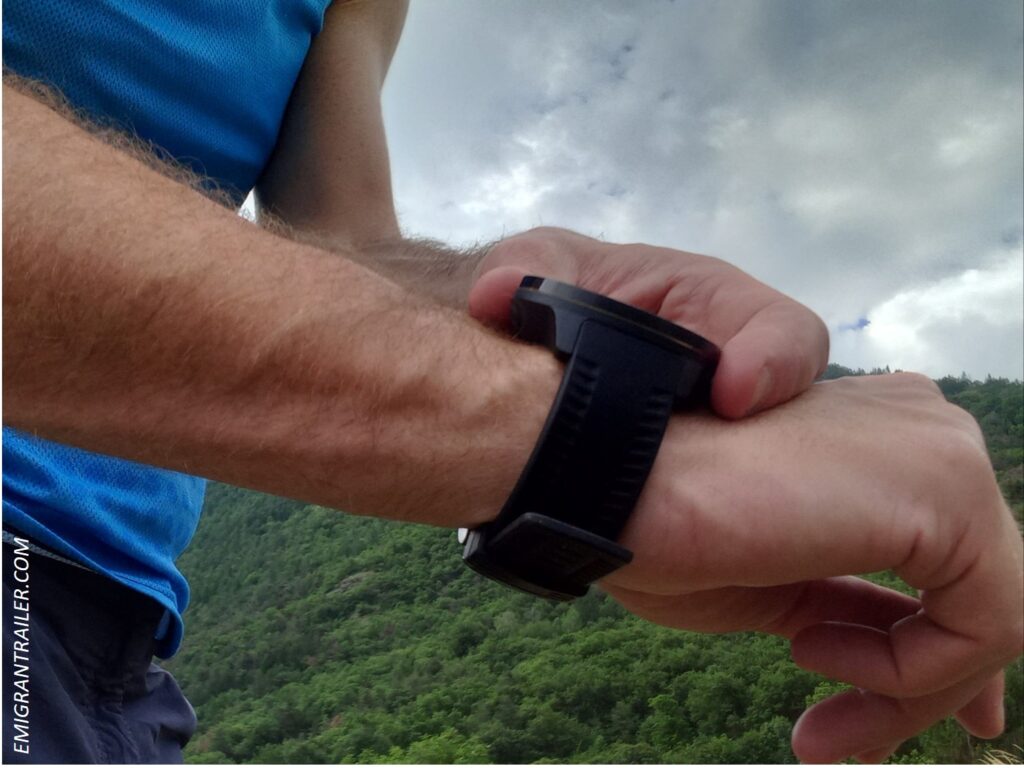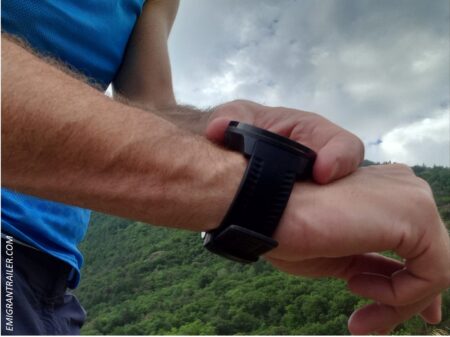
This is a question I have never directly asked myself personally: simply, I never pause my watch when I go out to run on the trails.
However, it is a question that I have often asked myself looking at many (a lot) of friends and runners with whom I have run in recent years, both in Italy and in Germany.
Whether it is a break to pee, to drink, to eat, to take a photo, to cross a street, to put on a jacket, or whatever, the first thing I see many of them do is click the button on their gps watch to pause the recording of the activity.
I never understood it, and still, I don’t understand the reason and the advantage. Especially for those who train for Trail-Running or Ultra Trail and do not not execute specific exercises (i.e. interval trainings) on flat road with breaks in the middle.
I asked the reasons to my friends who use to pause it at any single break.
So far, none has really given me a reasonable answer.
Do you pause your gps watch while Trail Running? If so, why?
Therefore, now I widen the question to whom will read this article: if you do it, why do you pause your gps watch while trail-running?
There might be thousands of reasons I am not aware of and, in the meantime, I do not want to puzzle over “why they do it”.
In my opinion, there are no advantages or benefits to pause it (and later I explain why)..
However, if someone would list me some useful advantages in doing Trail-Running, I’m ready to change my mind.
Since I practise trail-running, I always used to look at the time when I start the training and then the time when I finish my training. I have been doing it since gps watch were not yet widespread. And sometimes, I put my gps in the backpack (for example, I did this between km 40 and km 70 at the UTMB-CCC in 2018).
Well, I know: I am a bit “old style”.
In short, I am always interested in the overall time of the activity, and not just the time in movement.
No pause, more advantages
So, as said, I never pause my watch while Trail-Running.
The motivation is very simple: there are several advantages.
At least five possible advantages come to mind:
- When you are in a race or competition, it always counts the overall time. This includes all the stops or breaks when you are at the refreshment points, when you stop to pee, when you stop to take a picture, when you stop to wear a windbreaker and so on. So, if someone really wants to train “physicall and mentally” to understand how long it will take to finish the race, it is definetively an advantage to train letting the time run on your watch, without pausing it. In fact, with the opposite operation, the risk is to arrive at the race with an expectation that is “distorted” by the habit of pausing the watch at every single break.
- There is no risk of forgetting to restart the watch after the break. With friends who have this attitude to pause their gps watch, it happened several time to hear them exclaiming: “Damn, I forgot to restart my GPS!”. My reaction is always “smiling” to this exclamation. Obviously then it comes the second sentence from my friends: “Can you please pass me your gps track at the end?”. And at that point, I laugh out loud.
- There is no risk that distance, mileage, and altitude are altered. In fact, by pausing the clock, it could happen that the crossing of the GPS signals needs a few moments to update. This can affect the actual measurements of the activity.
- The recent GPS have very well-done Apps (Suunto, Garmin, etc.) where it is already displayed the difference between the time in movement (excluding the breaks) and the overall time (including breaks). The same concept applies to Strava, or similar Apps. So, if you do not pause the watch, you can also better understand how long it took to be on a break to cool down, to relax, and you can have a greater awareness of your energies and limits (above all).
- For the younger (and more competitive), if you are a segment and crown hunter on Strava, you need to know that Strava’s software recognizes if you pause your activity during one of these segments (Strava | Monitoraggio corsa e ciclismo sul social network per gli atleti). So, do not be surprised if at the end of the activity you will not find your name in the final rankings! 😉
In short, in my opinion, there is really no use and advantage in pausing the gps watch while Trail-Running.
If you find any relevant, please educate me! 🙂
Related projects and articles
Other articles belonging to this categories can be found at the following links:
Enjoy Trail-Running!
Andrea
p.s. obviously it is quite another matter if you are doing education activities with long breaks for practical (posture, materials, etc.) and theoretical lessons, or if you are running on the road for specific intervals exercises.
Original post in english language. For other languages, please open with a web browser (i.e. Chrome) and apply the automatic translation.




Allora… tempo per un commento 🙂
Let me first add to your advantage number 4 that a lot of GPS watches still get it very wrong. Strava automatically shows only time moving by default not total time in the splits and the altitude drawing. I’ve seen several times (especially on older Suunto) from different people that they had super splits/speed and a lot of difference between those two times when i fact they never stopped. There must be lots of mini-holes of several seconds where the watch loses GPS and therefore it counts as not moving. So to rely on your watch to know exactly how much you stopped doesn’t work really well. I have a Stryd footpod so my time moving is quite spot on but I still stop the watch to get exact stop times (hey I’m moving around in the aidstation) and Trainingpeaks shows it when and how long I stopped.
Regarding (1) – I want to know how much time I spent on aidstations in race. That for me is a different thing then time running so different approaches to optimize it in another race.
2 is totally true tough 😉
Number 3 does not happen with Stryd so yes that could be a consideration. Also my old Forerunner sometimes did jumps in altitude after stopping. The new Garmin Fenix doesn’t do it anymore.
Alright then my reason why I do it in training. I just want to know the real numbers of my running. The average pace here and there, the average wattage. The time it took me for a certain route etc. There are days where you run with somebody and take more photo breaks. Sometimes other people have to pee you have to wait. Maybe you encounter somebody and talk for a little bit or it’s a new route you planned on outdooractive and have to stop and check for the route on your mobile phone. Or I stop and have to refill my water somewhere it takes more time (then in a race) etc. I just don’t want to skew my running statistics fully aware of what happened.
For example in the TDS I had my split times that I wanted to run based on pure running time. Now I was completely wetted out in that rainshower and did not wear appropriate gloves so I was freezin to death and stopped at col du st. bernard to change clothes etc. I have no idea how much time I spent there but my paper splits were still valid because I stopped. Same goes for what happened on Passeur. I stopped so I could have relied on my splits had it not been cancelled…
Thanks Andreas for the very detailed answer! And I fully understand your approach “why you do it in training”. It is a personal choice and, what it is really counts is how much every single individuals is confortable with either one or the other approach. For beginners (not your or my case), I still believe that it would be very useful if they “forget” that they wear a clock when they train 🙂
Thanks Andrea for these article. I just had these discussion with someone of my close running buddies. She always stop and post it on Facebook.
( 30 k in ~ 06:30 are in reality ~07:15)
Because of the circumstances that Strava showed that she refused to use Strava. At my watch the automatic start/stop function was activated from the beginning but I am on Strava.
We are running for us not for others or Facebook and so the “stoppers” only cheat themselves .
Thanks Stephan. I fully agree. We run for ourself, not for social medai or others! 🙂